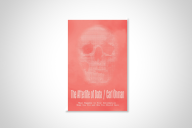You have /5 articles left.
Sign up for a free account or log in.
Early in the summer of 2002, the National Press Club, in Washington, sponsored a panel on the phenomenon of blogging. The turnout was rather modest. The journalistic buzz over blogging -- soon to become deafening, once the presidential campaign got underway -- was as yet little more than a puzzled murmur. The idea of blogging as a political force wasn't even that high on the agenda, if memory serves. It must have come up, of course, but it was not the most striking thing about the discussion. No, what sticks in my memory, three years later, was the presence of Doug McLennan from ArtsJournal, the indispensable daily digest of cultural reporting, and of Dennis Loy Johnson, whose Moby Lives was one of the first literary blogs.
Later that day, Johnson, formerly an English professor at Allegheny College, sat in my living room, elaborating his grand vision of blogging as a means of revitalizing the culture. (It is hard to write about this now without some retroactive irony.) His idea was that literary blogging would provide an alternative to The New York Times Book Review and suchlike. But it could do more than that. It would help foster a kind of counter-public sphere: Writers and readers could meet sans the influence of the big publishing conglomerates. The do-it-yourself ethos would be revitalized, and Random House wouldn’t know what hit 'em.
I listened -- supportive, but skeptical. You can participate in just so many let's-overthrow-the-media discussions, after all, before being a little too familiar with the inevitable topoi. The great thing about the counterculture is that it comes from a tradition that is centuries old; the awful thing about it is that the apocalypse never comes.
In any case, having reservations about the impending showdown is not necessarily proof of cynicism. Rather, it's a matter of thinking that, in the end, somebody is going to have to put up or shut up. Having started out in the ‘zine world during the first Reagan administration, I’ve now read far too many cultural fatwas by literary "movements" uncontaminated by talent ever to take one at face value ever again.
Well, for his part, Dennis Loy Johnson has managed to put up. He went on to start an independent press, Melville House Books, which in three years has published about two dozen literary and political books. Countless literary blogs started in the wake of Moby Lives -- some by people who emulated Johnson, and some by people who loathed him. (Another countercultural tradition, that: By the time Allen Ginsberg got "Howl" into print, 50 years ago, there must have been some fierce young beatniks furious at the sellout.)
He's let Moby Lives "go dark" from time to time, as the theater people say when the stage closes down for a while. Understandable enough, given the effort required to keep Melville House running. The site went dark this summer -- with a page announcing, first, that Moby would return in August, then in September. By October, I was checking it more from force of habit than real expectation.
Then, last week, Moby Lives was reincarnated – as an online radio program. My wife, who is far more infotech-minded than I am, rolls her eyes at the expression "online radio program" and insists that it be called a "podcast." That locution is much too reminiscent of something from Invasion of the Body Snatchers, however. And anyway, you have to listen to Moby Lives through Real Audio. You can't actually download it to an iPod (or any other such gizmo), though evidently that option will soon be available. So technically Moby has only halfway metamorphosized from blog to pod. (O brave new world, that has such lingo in it.)
In any case, it was a surprising development, so I called Johnson to find out more about how it came to pass. The Melville House office (and impromptu radio studio) is in an old factory building. As we talk, I hear various booms and crashes in the background. It’s pretty clear that there will be times when Moby Lives 2.0 won’t quite sound like anything from National Public Radio.
"I’ve been wanting to do this for a long time," Johnson says. "It’s just been a question of finding the time to learn how to do it. The curve on it has been difficult for me. I’m not particularly astute at these things, which is why the blog never got beyond HTML. That was about as much as I could do."
He says the equipment "is all really small, and really expensive." A freelancer does the engineering work, helping him to edit the various recorded bits into a single program. At the end of the day, Johnson records a survey of publishing news to serve as the opening for the next morning's program. Other features are drawn from telephone interviews. During Moby's first week, guests included David Kipen, the new director of the literature program at the National Endowment for the Arts, and Sara Nelson, an editor at Publishers Weekly. There are also short humor pieces – including a sort of fractured Masterpiece Theater segment in which Johnson reads excerpts from classics of world literature as rendered by an online translation program.
Even apart from the occasional mysterious background noise, the recording quality is, he admits, a little rough. "That’s why we tried to sneak online with it. I didn’t send anything out to our mailing list about it, or contact the blogs."
But the latter decision might also reflect disenchantment with blogging. What he hoped, three years ago, might foster an alternative culture now strikes Johnson as a new tool in the hands of mainstream publishers. "Blogging has become another outlet for them," he says. "I hear from their publicists on a daily basis."
Are university press publicists making the same kinds of pitches? His answer comes as a surprise to me: "I don’t hear from university press people as much as you might think, unless they’re doing poetry, since they know I’ve covered poetry a lot. But scholarly books, no."
He doesn’t think of university presses as part of the problem. While references to "the crisis in academic publishing" are commonplace in some circles, few people in literary journalism or the blogosphere have heard of it. "University presses are as under assault as any other kind of independent publisher," Johnson says. "I don’t think people in the literary world really understand that."
The move from print to audio only looks like a new departure. "I was a film major as an undergraduate at Boston University," he says, "and took all my basic classes in communications from acolytes of Edward R. Murrow and Fred Friendly. I worked at the student radio station there, at the same time as Howard Stern, of all people, not that I really have any memory of him. But I always thought I’d end up a broadcast journalist."
It isn’t a question of creating some whole new form of alternative media, then, so much as it is keeping faith with the old school. "Back when Mary McCarthy went on 'The Dick Cavett Show,'" says Johnson, "he had her on because she was Mary McCarthy, not because she had a new book out. That’s the principle with Moby Lives radio. We want to have on people with something to say, not something to sell."








